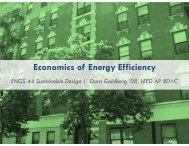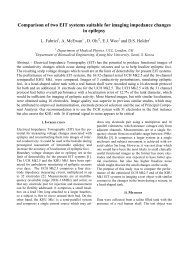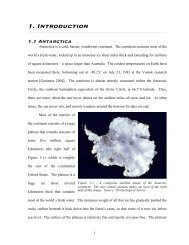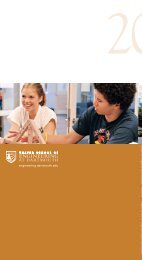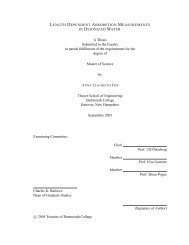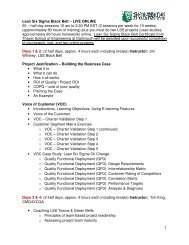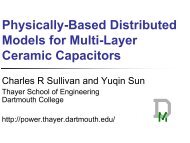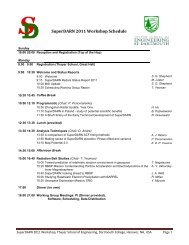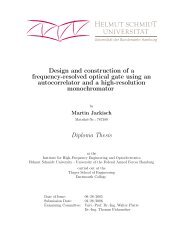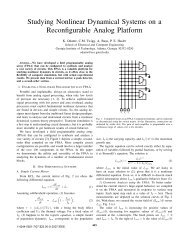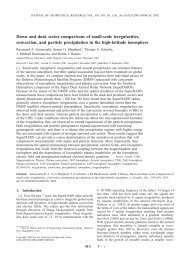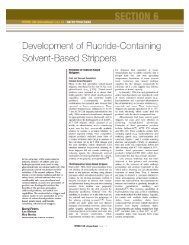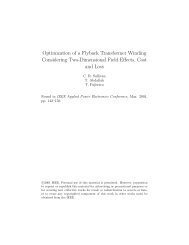Courses Programs - Thayer School of Engineering - Dartmouth ...
Courses Programs - Thayer School of Engineering - Dartmouth ...
Courses Programs - Thayer School of Engineering - Dartmouth ...
You also want an ePaper? Increase the reach of your titles
YUMPU automatically turns print PDFs into web optimized ePapers that Google loves.
graduate courses<br />
112<br />
ENGG 299 Advanced Special Topics in <strong>Engineering</strong> Sciences<br />
(Cannot be used to satisfy any A.B. degree requirements)<br />
Offered: all terms: arrange<br />
A special topics course in lieu <strong>of</strong>, or supplementary to, a 200-level course, as arranged<br />
by a faculty member, to be used in satisfaction <strong>of</strong> degree requirements. The course<br />
must be approved by the graduate programs committee in advance <strong>of</strong> the term in<br />
which it is <strong>of</strong>fered. No more than one such course may be used in satisfaction <strong>of</strong><br />
requirements for any degree. Requests for approval must be submitted to the program<br />
director no later than the eighth week <strong>of</strong> the term preceding the term in which the<br />
course is to be <strong>of</strong>fered, to permit action prior to the term’s end. Proposed courses<br />
should include full syllabus, resources and student evaluation methods. <strong>Courses</strong> that<br />
do not have a 100-level prerequisite should use ENGG 199.<br />
ENGG 309 Topics in Computational Science<br />
(Cannot be used to satisfy any A.B. degree requirements.)<br />
Offered: arrange<br />
Contemporary theory and practice in advanced scientific computation, organized by<br />
physical application area. Course comprises two 5-week modules, selected from the<br />
following:<br />
Computational Fluid Dynamics. This module covers four basic contemporary<br />
issues: (i) the inherent nonlinearity <strong>of</strong> fluids; (ii) the mixed hyperbolic/elliptic<br />
nature <strong>of</strong> the differential equations governing fluid motion; (iii) the concomitant<br />
algorithmic complexity <strong>of</strong> their numerical treatment; and (iv) the size,<br />
i.e., the large number <strong>of</strong> degrees <strong>of</strong> freedom found in most realistic problems.<br />
Discussion <strong>of</strong> advection-dominated flows: physical and numerical properties;<br />
temporal and spatial discretization issues; method <strong>of</strong> characteristics, upwinding,<br />
Galerkin and Petrov-Galerkin methods; artificial viscosity. Navier-Stokes<br />
and shallow water equations in 2- and 3-D: mixed interpolation; primitive<br />
equation and higher-order formulation; staggered meshes; boundary conditions<br />
on pressure, transport and stress; radiation conditions. Frequency domain<br />
solution <strong>of</strong> hyperbolic problems: nonlinear generation <strong>of</strong> harmonics; truncation<br />
errors in iterative methods<br />
Prerequisites: ENGS 34 and ENGS 105, or equivalent<br />
Instructor: Staff<br />
Computational Solid Mechanics. This module will deal with the development<br />
and application <strong>of</strong> finite element methods for solid mechanics problems. After<br />
a brief treatment <strong>of</strong> the theory <strong>of</strong> elasticity, the finite element equations for<br />
elastic solids will be developed using variational techniques. Applications in<br />
two- and three-dimensional static elasticity will be considered. Techniques will<br />
then be developed to analyze the following classes <strong>of</strong> problems; nonlinear<br />
material behavior, especially plasticity; plates and shells; problems involving<br />
contact between two bodies; and dynamic analysis <strong>of</strong> elastic bodies.<br />
Prerequisites: ENGS 33 and ENGS 105, or equivalent<br />
Instructor: Kennedy<br />
Computational Electromagnetics. This module focuses on numerical solutions<br />
<strong>of</strong> the Maxwell equations. Emphasis will be placed on problem formulation<br />
and implementation issues. Examples will be selected from a broad spectrum<br />
<strong>of</strong> topics such as electromagnetic scattering, waveguides, microwave circuits<br />
and strip-lines, bioelectromagnetics. Development <strong>of</strong> s<strong>of</strong>tware to solve representative<br />
problems will be required. It is anticipated that the student will be<br />
capable <strong>of</strong> reading and understanding the current computational electromagnetics<br />
literature upon completion <strong>of</strong> this course.<br />
Prerequisites: ENGS 105 and ENGS 120<br />
Instructor: Staff



